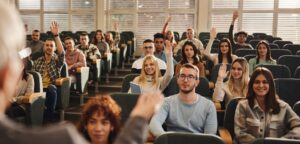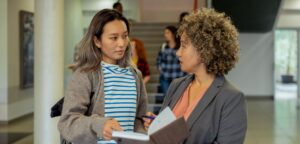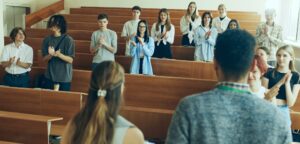
A Simple Hack for Focused Discussions: The Follow-Up List
“Why does my edition of Hamlet read ‘O, that this too, too sullied flesh would melt,’” my student Jake asked me, “but yours has ‘O, that this too, too solid flesh would melt’?”

“Why does my edition of Hamlet read ‘O, that this too, too sullied flesh would melt,’” my student Jake asked me, “but yours has ‘O, that this too, too solid flesh would melt’?”

I often wear sunglasses on my walk from my parking spot on campus to my office. I recently realized that when I have them on, I am seeing but not really seeing. The shaded lenses provide a buffer from the world. I stroll by a

On a recent walk across campus, I ran into a student who had taken my class last year. She is Latina and a first-generation student who I remembered being politically outspoken in class and a fierce advocate for immigrant rights. I asked how she was

In teaching, unaddressed countertransference has profound implications for educators and students alike. Consider the story of my past student who experienced heart-wrenching life circumstances during the semester: He lost both parents and became the primary caregiver for his younger siblings. Naturally, his GPA fell significantly

Over the past several years, I have had the deep privilege of participating in The Way of Remembering (WOR), a spiritually grounded journey to Benin that looks at intergenerational trauma and healing through the lens of African ways of knowing. Benin is a beautiful country

The start of a new semester is an emotional experience. As a former kindergarten teacher, I vividly remember spending much of the first day of school making students feel welcome and comforting them while they cried. Whether you are teaching five-year-olds or 25-year-olds, the need

During my third year of college, another student that many of my friends interacted with, who tutored some of us, died. While I wouldn’t call him a close friend, he was an acquaintance, and his loss was felt deeply. I remember wanting to cry, but

One of the courses I am teaching this semester is a senior-level course titled Autonomic Nervous System Regulation. In this class, we examine the autonomic nervous system (ANS), which is the part of our nervous system that governs involuntary physiological processes, such as our heart

Do people learn in the same way or different ways? According to cognitive science, the answer is the former. There are general principles of learning that apply to everyone, such as the importance of attention and the value of good learning strategies like spacing and

I am a political science professor. And we are in the middle of a hotly contested presidential election campaign. My classes are going about how you’d imagine: students are excited, sometimes talking over one another, and occasionally throwing out wild hypotheticals.

Magna Publications © 2024 All rights reserved